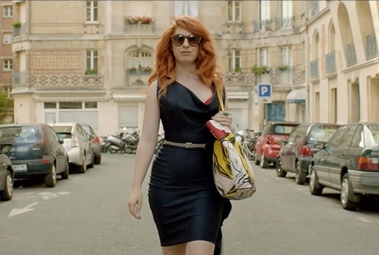Writer-director Sophie Mathisen didn’t tread the usual path in making her first film, Drama.
While studying for her MA at London’s Royal Central School of Speech and Drama, Sophie was charged with making a short for her thesis.
Having had an idea “kicking around” her brain for years, she pitched a feature instead. She locked herself away over eight days at Christmas to write a script, and enlisted her sister, Dominique, to be her producer.
The result was Drama, a “friendship romantic comedy” about a down-on-her-luck Aussie actor, Anna, living in London – played by Sophie. Still hung up on an ex, Anna travels to Paris to visit her best friend Jean (Jonathan Burtreaux). However the timing isn’t ideal: Jean is having issues with his own partner, Philippe (François Vincentelli).
The team was shooting eight months after the script was finished. The short time frame they had to complete the film meant they decided to make it off their own bat, eschewing the “carrot” of the government funding route, Sophie told IF.
“Sometimes it doesn’t end up benefiting you; it can be something that keeps you locked in this stasis, where you’re not working.”
They never were likely to be eligible for funding anyway, said Dominique.
“We had no runs on the board,” she told IF. “We really just had to go, ‘let’s do this and make it a calling card’.”
It’s a “weird film” on paper, according to Sophie: an Australian film, shot in Paris, 50 per cent of which is in French. “It’s no Red Dog. It’s no Last Cab to Darwin (laughs),” she said.
“Realistically, we were going to be shooting in Paris with a non-Australian crew,” said Dominique. “All of those things were stacked against us in terms of funding. We would have never gotten through; it’s just the fact of the matter. Especially as debut filmmakers.”
The budget ended up at $330,000, financed through private equity and crowd-funding. Sophie said her theatrical background was an advantage, as it taught her how to make “nothing look like everything.”
“We knew where to scrimp, where to save and where to spend the money. We really made sure that we put all of that money in front of that camera to make it look as professional as possible,” she said. “This is definitely not something that was shot on a Canon 7D.”
Meeting other indie filmmakers when touring the international festival circuit with Drama was heartening, said Dominique.
“It’s not such a foreign concept when you actually step out overseas. That entrepreneurial ‘I’m just going to do it’ [spirit] happens everywhere, but it’s really new in Australia. Not that we’re tagging each other as pioneers. But we want to be surrounded by people that are doing this as well, so we don’t feel so unsupported.”
The sisters were encouraged to see fellow indie Pawno pick up AACTA Award nominations.
“There are so many other ways to make content; you don’t have to necessarily get in bed with a funding agency. One of the things that we’ve been looking at in future projects is ‘how do we monetise this and monetise this fast’,” said Sophie.
“We don’t want to be sitting in development. I do think that ideas have shelf lives. It’s problematic when you are asking a creative to sit with an idea for five to seven years. Especially as a young woman. My ideas since shooting the film 2.5 years ago have already shifted. If I was still sitting with that character I don’t think I would have the same vigour for her.”
On set, the sisters enforced a 50 per cent female gender quota across departments.
Having spent the last decade as a make-up artist, Dominique said she was sick of being referred to as the “glamour department” by other male crew.
“That’s really patronising. There are so many cool chicks that do so many great things. I think that comradery between women when we all link arms and walk forward is really strong. I think if we, as first time filmmakers, acknowledge the strength in that, then we’re doing something progressive for the industry.”
Drama was released day and date last week: in cinemas via FanForce the same day it was released on iTunes and Vimeo.
The sisters chose that route primarily out of budget restraints. Sophie noted that the traditional theatrical release model tended to work against those who couldn’t afford to keep their film in cinemas until word of mouth took hold.
“Word of mouth takes time, and it takes a real level of preparation. But it also takes a huge amount of advertising to keep it in people’s faces.”
“I really think the day and date model works particularly well for independent filmmakers, or filmmakers who have content that doesn’t necessarily fit the multiplex model.”
Despite the inevitable rows that come when working with a sibling, the sisters agree: they make a good team. Next in the pipeline is a documentary, as well as a optioning a book. They’re also hoping to make two more features about women in their 20s and 30s.
Watch Drama now on iTunes or Vimeo.
Book a screening via FanForce.


